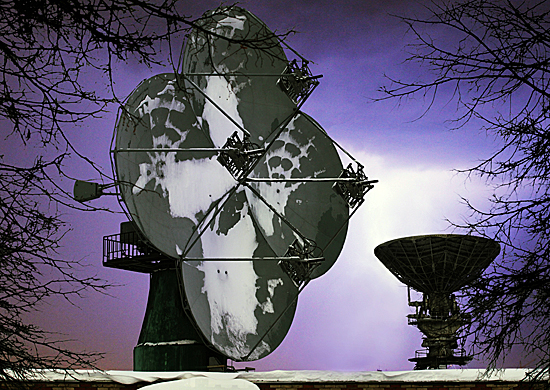
The Kremlin, the VKO and the Search for ‘Luke Skywalker’
Publication: Eurasia Daily Monitor Volume: 9 Issue: 145
By:

The Kremlin continues to struggle with balancing the needs of modernizing the conventional Armed Forces, renewing the strategic nuclear deterrent, and also forming and supporting the imprecisely defined high-technology demands of the Aerospace Defense Forces, while depending on a defense industry struggling to escape the 20th century (Vozdushno Kosmicheskaya Oborona – VKO). Recent articles and expert commentary in Moscow suggest that the VKO will absorb a huge amount of intellectual and financial resources and will open multiple opportunities to repeat the mistakes in reforming the conventional Armed Forces (EDM, July 24).
On June 29, Komsomolskaya Pravda’s defense correspondent Viktor Baranets provided an overview of VKO force structure, missions and future challenges. Baranets notes that the Defense Ministry and General Staff had maintained careful watch on the trends in modern warfare, examining how the United States and other NATO countries had harnessed air and space attack systems in their campaigns in Yugoslavia, Afghanistan and Libya. The VKO’s missions are as follows: “supporting the management of reliable information on the detection of launches of ballistic missiles and warning of a missile attack; engagement of the warhead sections of a probable adversary’s ballistic missiles attacking important state facilities; protection of the command posts of the highest levels of public administration and military command, force contingents, and the most important industrial and economic centers and other facilities against the strikes of an enemy’s means of air and space attack within the impact zone; monitoring space objects and ascertaining the threats to Russia in space and from space and, if necessary, countering such threats; launching spacecraft into orbit, controlling military and dual-use (military and commercial) satellite systems in flight, and employing some of them in the interests of the provision of Russian forces with the necessary information; maintaining in the established composition and readiness for employment of military and dual-use satellite systems and their launch and control facilities; and a number of other missions” (https://kp.ru/daily/25907/2863580/).
Baranets writes that it is much easier to define the VKO’s missions than to form a new operating system capable of repelling all air and space threats. Unless the Defense Ministry and General Staff use expertise among the military-scientific research community, the VKO will suffer the muddle and confusion that has marked the “new look” reform of the Armed Forces. Baranets argues that on the plans for the reform of the Armed Forces a bitter harvest is being reaped due to the absence of consulting military experts, “owing to which the generals now have to continually adjust the plans of military organizational development, abandon decisions made earlier, and reconstitute what was injudiciously destroyed.” The VKO, in his view, may have access to greater expertise through the Independent Air and Space Defense Board of Experts. A meeting of this body in late June discussed problems related to VKO development and sent proposals to the Defense Ministry (Komsomolskaya Pravda, June 29).
A recent article in the Defense Ministry’s paper Krasnaya Zvezda profiled the activities of a VKO brigade in the Western Military District, operating in an area stretching from Norway to the Arctic Ocean island of Novaya Zemlya; the brigade’s subunits are located at approximately 80 locations on the Kola Peninsula. The article noted that lieutenants are paid around 80,000 rubles monthly ($2,495), or one third less than a colonel. However, it also highlighted that although the automated command-and-control (C2) system handles vast amounts of information, the introduction of more of these systems is expected next year, as well as a new electronic document management system. While Russian society embraces information technologies, life for the VKO brigade personnel in the remoteness of the Barents Sea coastline provides a sharp contrast. Personnel are understandably discouraged from using their cell phones as they would pick up roaming services provided by Finnish or Norwegian networks. At the same time, however, the military communications infrastructure remains under developed. Although the introduction of advanced high-technology communications assets is sporadic in the brigade, they can still use Soviet manufactured VHF stations to “see” invisible stealth targets at takeoff in Norway (Krasnaya Zvezda, July 13).
In an article in Nezavisimoye Voyennoye Obozreniye, Colonel-General (retired) Viktor Yesin, Professor of the Academy of Military Sciences, explored the background and conceptual underpinning of the VKO before turning to consider the sheer scale of the undertaking involved and the enormous challenges it faces in relation to the domestic defense industry. Yesin’s critique was so damning that it is little wonder that his title referred to the “holes and windows” in Russia’s anti-missile defenses. Turning from the theory of forming the VKO to its more practical implications, Yesin declared that the Russian government will need to support a massive effort to reverse the currently negative situation in the development and manufacturing of high-technology weapons systems. Otherwise, the VKO will simply lack essential assets. Significantly, the VKO faces the problem of unifying the overall system of automated C2, as it has inherited nine separate management information systems from the air defense forces. Moreover, there is no clarity in how the VKO fits into the military district structure. Yesin notes that incorporating the VKO into a fully integrated management information system will demand resolving major technical problems (https://nvo.ng.ru/concepts/2012-07-27/1_pro.html).
Yesin concludes by arguing that the defense industry simply lacks the capacity to facilitate the development of a genuinely advanced VKO capable of ensuring the coverage of the entire country in the way the political leadership hopes. Instead, Yesin outlines an alternative vision for the VKO, which recognizes that Russia is shielded from large-scale aggression by its strategic nuclear deterrence, and consequently the VKO should provide cover for the strategic nuclear forces. Its second and third priorities would relate to developing air and air defense support for operations in local conflicts and offering protection to critical infrastructure (Nezavisimoye Voyennoye Obozreniye, July 27).
Indeed, on the future shape and evolution of the VKO, or how to tackle key issues, there is no shortage of expertise on offer; recent articles in the Russian military press consider the VKO from various perspectives, including detailed coverage in one article in Vozdushno Kosmicheskaya Oborona addressing the complexity of Maskirovka in the VKO to deceive enemy forces (https://www.vko.ru/DesktopModules/Articles/ArticlesView.aspx?tabID=320&ItemID=502&mid=2869&wversion=Staging).
But Baranets and Yesin agree on common themes; for them, the VKO is a newborn entity, created in December 2011, and it will face long-term issues that require avoiding the mistakes so evident in reforming the Armed Forces. Russia needs to devise and systematically support the future of the VKO, but it must do so realistically, recognizing the existing weaknesses of the domestic defense industry. Military experts must strive to convince Russian politicians that they can only support a realistic model of VKO development, and not entrust countless billions of rubles to a state-led flight of fancy. While the expert community in Russia in this area may be more able to offer analysis to underpin the VKO in its formative years, the Kremlin’s efforts to compel the military to literally reach for the stars lacks a credible “Luke Skywalker.” Convincing and compelling leadership will be required at all levels, open to critical thinking and capable of helping to shape a real VKO for Russia’s 21st century security requirements; unfortunately, there is little evidence of forward thinking among the current political leadership of the country.




